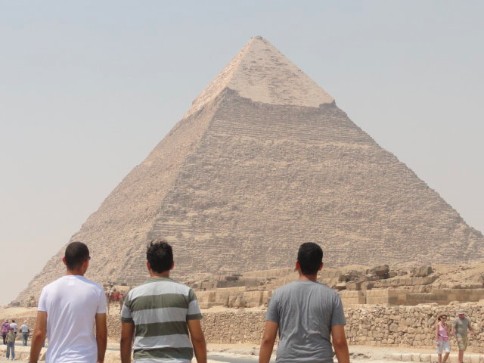
Egyptian Youth: 5 Key Trends According to the Arab Youth Survey 2014
The 2014 Arab Youth Survey has been released and reveals 5 core insights into the concerns and beliefs of the average Egyptian youth. The American Security Project held an event yesterday to discuss the overarching themes and results of this regional study, but the findings in Egypt specifically are very interesting and worthy of noting. This study helps to shed light into the hopes and dreams of the youth in the Arab world during this era of transition. I have highlighted the 5 most important take-aways regarding the Egyptian youth and will draw analysis from each.
1. Changing Values and Beliefs:
Modern values versus traditional ones are growing increasingly prevalent among Arab youth as globalization shapes their attitudes and behavior. 43% of Egyptian youth say traditional values are outdated and belong in the past. Only 17% of the overall youth population in the Arab world responded with the same answer in 2011, illustrating a dramatic increase in the importance of modern values among Arab youth just over the past 3 years. The rise in social media consumption, the use of smartphones, and increased exposure to new ideas through media and travel are believed to have caused this significant shift in youth perception. Such modern technology has not only helped spur a paradigm shift in values, it has also been used as a tool to organize protests, criticize leadership, and in general act as an outlet to express opinions and beliefs in a format unlike anything else. Since 2011 popular protests have unseated two rulers. It will be interesting to see how this new technological commodity continues to change values and beliefs in the Egyptian youth and the greater Middle East.
2. Concern Over Unemployment and the Rising Cost of Living:
Out of the 16 countries studied, Egyptian youth are ranked as the most concerned over unemployment. 62% of Egyptians are VERY CONCERNED about unemployment as the government struggles to provide jobs for their growing population. In addition, 61% cite the rising cost of living as their greatest concern, even above the national economy, opportunities for women, and the threat of terrorism. Clearly unemployment and the rising cost of living are on the minds of Egyptian youth, many of which have recently graduated from college or need to support their family. The new government’s ability to appease such anxiety in this large sector of society will determine their ability to remain in power.
3. Ideas on Entrepreneurship:
When asked “Do you feel people of this generation are more likely to start a business than in previous generations?” 71% of Egyptians said YES. According to the Arab Youth Study, entrepreneurial spirit is very high across the Arab world. This is a result of increased access to higher education and more accessible funding, but also is a response to the lack of jobs in general which forces people to take matters into their own hands. Unemployment in the Middle East and North Africa is twice the global average, with the youth bearing the brunt of joblessness. This entrepreneurial spirit is a necessity for the Arab youth, and will impact both the Egyptian and the region’s ability to thrive in the future.
4. What is the Biggest Obstacle Facing the Middle East and North Africa?
According to the Arab Youth Study, more than half (55%) of the youth polled say the biggest obstacle facing the Middle East and North Africa is civil unrest. They believe this obstacle will define the region’s ability to be successful in the future. The other top 4 obstacles cited were lack of democracy (38%), terrorism (30%), lack of strong leadership (30%), and the Muslim Brotherhood and Islamists movements (28%). This is an interesting finding, given that civil unrest completely altered the political terrain in Egypt. The youth are probably the largest proponents of civil unrest, but it appears they are also aware of its limitations as a means of progress.
5. Energy Subsidies Entitlement:
A remarkable trend illustrated in this study shows that an overwhelming majority of young Arabs feel entitled to subsidized energy costs. 70% of Egyptian youth think energy, electricity and transport fuel such as gasoline and diesel should be subsidized by the government. This sense of entitlement threatens the economy and encourages prolific use of limited energy reserves. This heavy subsidization gives little incentive to the average citizen to reduce their energy consumption, which has resulted in the Arab world being amongst the least energy-efficient regions in the world. In addition, concern over climate change and the environment are ranked at the very bottom out of 27 categories listed. This is a dangerous combination when you consider the arid and vulnerable climate of the Middle East and North Africa.
Conclusion:
This study was conducted across 16 countries in the Middle East and North African region, with a sample size of 3,500 and an even ration between men and women. The purpose of the Arab Youth Survey is to provide public and private sector organizations with data and analysis to inform their decision making and policy formation. These findings help give us a glimpse into the minds of one of the most important generations in the Middle East and North Africa. The youth were at the heart of the Arab awakening, in many countries they are the largest segment of society, and will be the leaders of the future. It is of upmost importance to understand such trends in the youth because their opinions will impact the political, social, and economic makeup of the region for decades to come.






[…] Egyptian Youth: 5 Key Trends According to the Arab Youth Survey 2014 […]